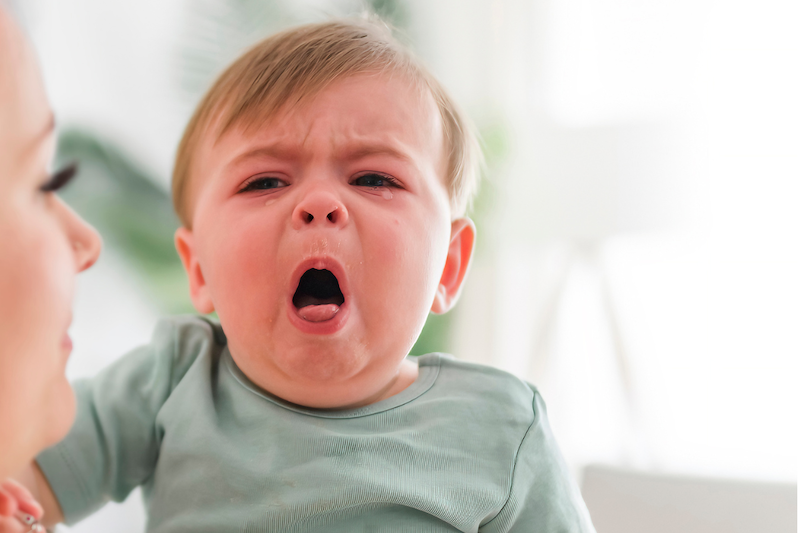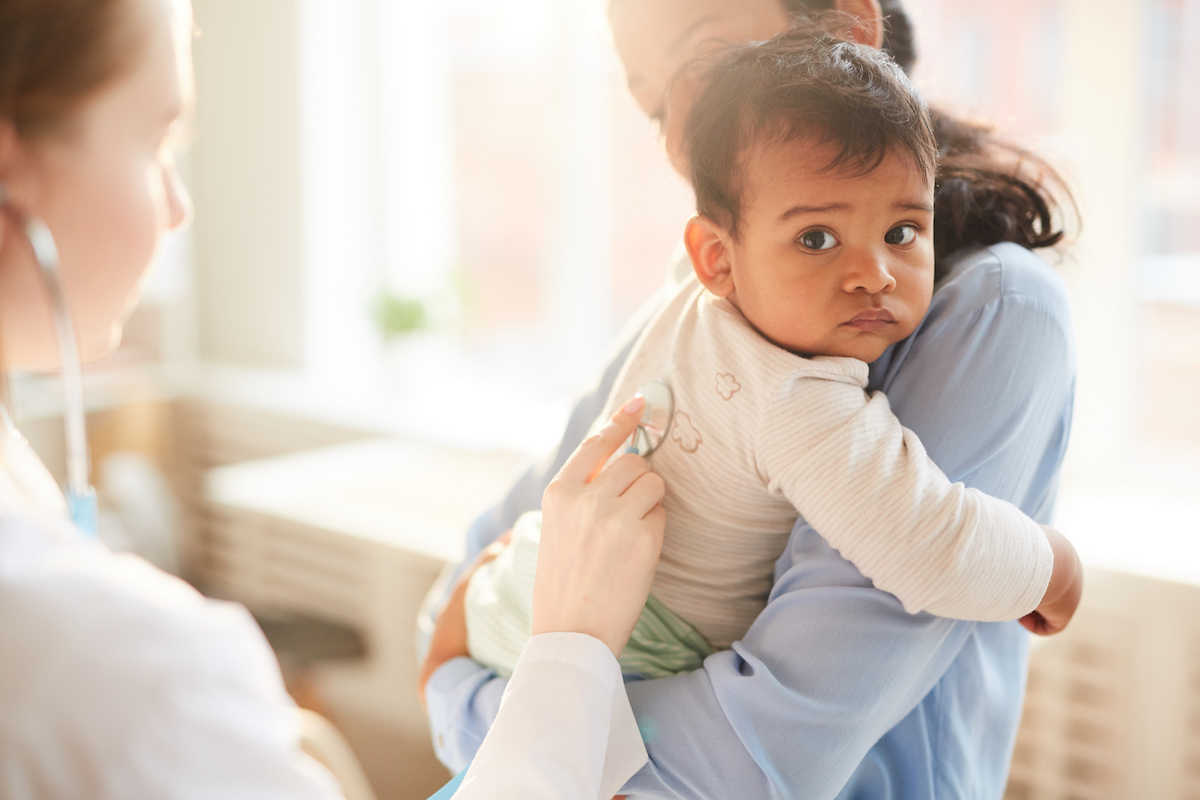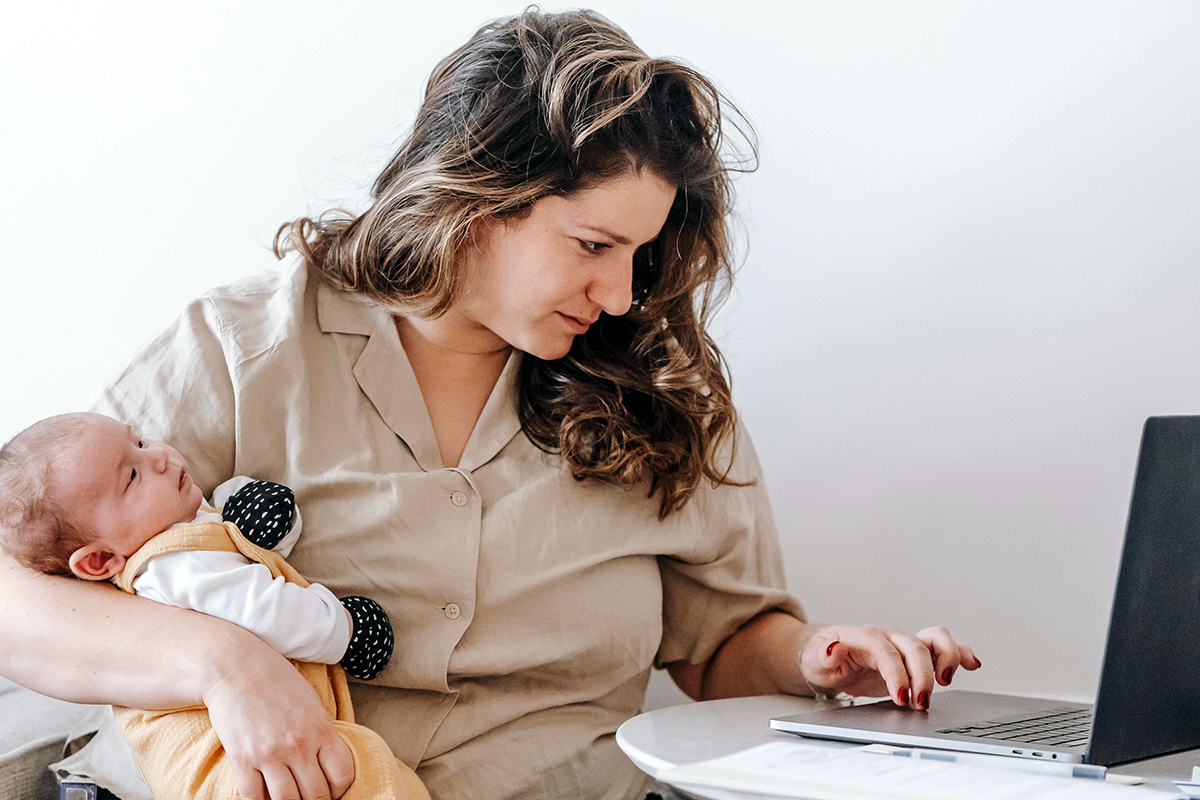If you’ve had a baby in the past few winters, you’ve probably heard of RSV. It’s an extremely common respiratory virus — most children get it by age two — and in most cases, it looks like a bad cold. But for very young babies, it can cause severe breathing problems and lead to hospitalization.
For a long time, there wasn’t much to do about that. Now, there are vaccines and antibody treatments that can dramatically reduce the risk of severe RSV in both infants and older adults.
Below, an overview of this respiratory illness — what it is, how to avoid getting it, and how to treat it if you do.

What is RSV?
RSV is an extremely common virus that causes lower respiratory infection; it’s most common during the winter (although see some caveats below).
RSV is the most common cause of these lower respiratory infections in children under 1 and is a significant source of hospitalizations. To give a sense of this: a study using data from the 2015-2016 season showed seasonal hospitalization rates of 2.9 per 1000 for children under 5, 6.3 per 1000 for children under 2, and 14.7 per 1000 for babies under 6 months. (By comparison, the COVID-19 hospitalization rate over the pandemic for children 0 to 4 is estimated by the CDC at 0.6 per 1000).
How serious is RSV?
Severe illness from RSV is a particular risk for babies under one, immunocompromised people of any age, and older adults. It’s transmitted with the standard respiratory transmission pattern: through close contact, droplets, or on surfaces. In contrast to COVID-19, RSV lives for several hours on surfaces, so it can be easily spread that way, in addition to direct contact.
RSV symptoms in small children are typical of lower respiratory infections (i.e., cough, lung involvement). For most children, treatment centers on supportive care (Tylenol or ibuprofen as necessary, rest, fluids, unlimited television). As with any respiratory illness, if your child is having trouble breathing or seems very sick, you should call your doctor.
Severe disease can manifest in bronchiolitis, pneumonia, and respiratory failure. Basically, think about a very bad cold with possible breathing issues. Treatment of serious disease, if necessary, typically focuses on breathing and oxygen support. Since RSV is a virus, it isn’t directly treated with antibiotics (although it is possible secondary bacterial infections would be treated with them). Children typically recover without long-term impacts, although with serious illness, there can be ongoing wheezing and lung function risks.
Older children and adults also get RSV. In fact, having had it before doesn’t provide much protection, so we are all getting it a lot. For healthy older children and adults, though, the disease is typically mild or asymptomatic. It can be more concerning for immunocompromised older adults.
For young babies, it is clear that RSV is serious. Talk to any pediatrician, and you’ll hear this. I was often struck during the pandemic by the number of times pediatricians told me some version of “I’m just thankful that COVID doesn’t present like RSV in kids.”
How contagious is RSV, and how does it spread?
In epidemiology, the contagiousness of a virus is generally summarized by what we call “R0”, or “R-naught”, which is an estimate of how many people an infected individual is expected to spread the virus to. For RSV, this value is estimated at 3. This makes it more contagious than COVID-19 or the flu, but much less contagious than measles.
RSV is a respiratory virus, so it’s spread the same way a cold is — through close exposure to saliva or droplet secretions from infected people. When an infected person coughs or sneezes, droplets can land on others, getting into their mouth, nose, or eyes and infecting them. Close contact — such as wiping a child’s nose and then touching your own face — can also spread the virus.
What are the options for preventing RSV?
For most older children and adults, prevention of RSV is similar to that of any other respiratory virus. Your best option is to wash your hands, avoid touching your face after wiping someone else’s nose, and encourage your children to do the same. A large share of adults and older children will get RSV each year, and for the most part, it will not be serious.
For more vulnerable populations — older adults and babies — there are more options. Namely: vaccination or a similar immunization. These are relatively new options, but they are effective and exciting.
Vaccination for older individuals
For individuals over 60, a vaccine is available for RSV (this vaccine is not currently approved for use in younger adults). This is a vulnerable group, and the vaccine is needed only every ten years, not yearly. This vaccine was first approved in 2023 and is sold under the brand name Arexvy. In the main Phase 3 trial of 25,000 adults over 60, the vaccine was 82% protective against confirmed RSV infection and 94% against severe disease. Side effects were generally mild — injection site pain or swelling, headaches.
Real-world data on efficacy, based on the first two years of use, is close to 80%. If you’re an adult over 60, this vaccine is a good idea.
Immunization to protect infants
There are two options for RSV protection for infants, both of which are new in the last couple of years.
The first is for mom to get vaccinated during pregnancy. There is a vaccine available — marketed under the name Abrysvo. In a Phase 3 randomized trial with nearly 3,700 pregnant women in each arm, efficacy against severe disease in infants over the first three months of life was estimated to be 82%; there were six cases in the vaccine group, versus 33 in the placebo group. Efficacy over six months was estimated at 64%.
At the time of the initial approval, there was a concern that RSV vaccination in pregnancy might increase the risk of preterm birth. Data from the real world in a large sample was, however, reassuring. This study, published in July 2024, uses data from New York State to compare preterm birth rates for women who had evidence of RSV vaccination during pregnancy with those who did not. The researchers found no sign of a higher preterm birth rate in the vaccinated group.
The second option is for the baby to be protected directly, after birth. In 2023, the FDA approved an immunization called Beyfortus for infants in their first RSV season. This isn’t a vaccine; it’s a monoclonal antibody. The core idea is that the shot delivers antibodies directly, unlike a vaccine, which induces the body to produce its own antibodies.
In randomized trials run before approval, the immunization provided excellent protection against RSV (about an 80% reduction in hospitalization and a 90% reduction in hospitalization with a need for oxygen). Real-world data has supported the efficacy claims. This study, published in The Lancet, compared RSV rates in 2023 — after widespread immunization — with prior years. It found almost a 70% reduction in the risk of RSV hospitalization and a nearly 90% reduction in the need for supportive oxygen. These numbers are not surprising given the success in randomized trials, but it’s very helpful to see this in the real world (and to see that there were no significant adverse events).
Which of these options is the best fit likely depends on the timing of birth. If you are expecting a baby in the fall or winter, both vaccination during pregnancy or giving the monoclonal antibody to the baby show similar efficacy — both will protect them during their first RSV season.
If you are expecting a baby in the spring or summer, after the RSV season, it is likely best to wait to get your baby immunized in the fall, so the protection is available when RSV is peaking. We know from trials that maternal protection wanes considerably by 6 months.
Two final notes. First: if you did get vaccinated during pregnancy in the late spring or early summer, it may be possible to also get your baby immunized. Insurance is unlikely to cover it, but it’s worth discussing with your doctor.
Second: the maternal vaccine is not currently recommended in subsequent pregnancies, as we don’t have the data yet on whether it is as effective in providing protection against RSV. You will most likely need to rely on the baby antibody option for protection.
The bottom line
- RSV is an extremely common virus that causes lower respiratory infection; it’s most common during the winter.
- Severe illness from RSV is a particular risk for babies under one, immunocompromised people of any age, and older adults.
- RSV is a respiratory virus, so it’s spread the same way a cold is — through close exposure to saliva or droplet secretions from infected people.
- For individuals over 60, a vaccine is available for RSV. For infants, there are two options for RSV protection: for the mom to get vaccinated during pregnancy, or for the baby to get an immunization called Beyfortus in their first RSV season. Which of these options is the best fit likely depends on the timing of birth.



















Log in
I got the RSV vax with my first in 2023. She came in November, and while it was newly recommended for pregnant women, but you helped me feel much more at ease. I was hoping to do the same with my second (also due early November) and my doctor actually recommended not to because guidelines said pregnant women should only get it once. Before that, another doctor had said the CDC hadn’t put out new guidelines yet because, ya know, our current admin is a joke. Wondering your thoughts on this and if you heard the same about only receiving it once.
On the CDC website for the maternal vaccine, it mentions that “Possible risks under further study: hypertensive disorders of pregnancy, including pre-eclampsia (a dangerous high blood pressure condition).”
What is the data supporting this statement? Is this the same as the pre-term birth risk that you mentioned above from the original trial?
thank you!!
I just went to my baby’s 9cmonth appointment where I was told she is too old for the antibody, as the cutoff is 8 months. She was born in January, and I was vaccinated for it while pregnant with her. The doctor told me my vaccine was still protecting her, but my research says 6 months max protection postpartum. Which is correct?
The protection from you is likely pretty limited now, but as kids get older the risk of serious illness goes down a lot, which is the reason for the 8 month cutoff.
My daughter was also denied the monoclonal antibody shot at 8 months and ended up being hospitalized for three days in the PICU with severe RSV. She is okay now but does have reactive airway disease. I think I read somewhere that they are also allowing it for toddlers who are up to 24 months old heading into their second RSV season. I would fight to get it for your kiddo, especially if insurance will cover it.
Of note, the RSV vaccine for adults is recommended at age 50-75 for people at high risk of serious illness and age 75 and up for all others.
Can you please clarify this point?
Second: the maternal vaccine is not recommended in multiple pregnancies, but the protection is not going to carry over across pregnancies. For subsequent babies, you will need to rely on the baby antibody option for protection.
Does this mean if I get the vaccine during my first pregnancy, it is not recommended to get it again in subsequent pregnancies because it will not be as effective is protecting subsequent children from RSV?
To my knowledge as a policy wonk, it’s not recommended in subsequent pregnancies yet because there’s not enough trial data on it. Theoretically, I would guess it should be like Tdap where you get it each pregnancy, but the CDC doesn’t have the info yet to say we should do that. (RSV Vaccine Guidance for Pregnant Women | RSV | CDC)
This is exactly right. There isn’t trial data on this yet, so it’s not recommended, but from a logical standpoint it should work like TDAP. There is a lot of variation in how doctors are interpreting this — some people are told they cannot get the vaccine again, and many people are getting it mulitple times. It seems to depend on your doctor (which is not ideal).